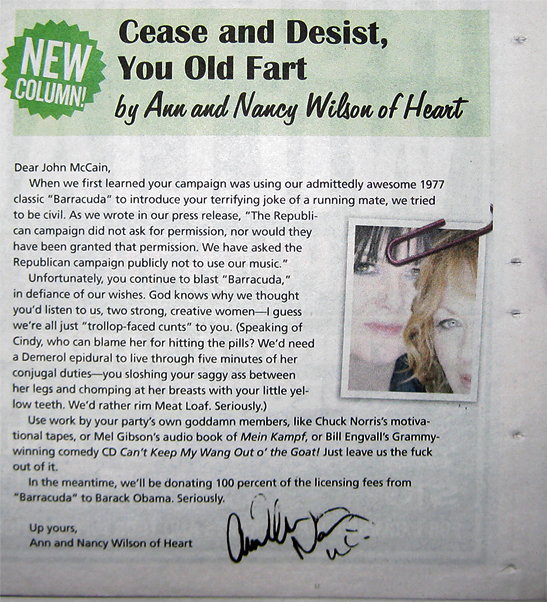Adventures in Astroturf —
Margriet Oostveen
describes in Salon.com how she composed phony letters-to-the-editor on behalf of the McCain campaign:
The assignment is simple: We are going to write letters to the editor and we are allowed to make up whatever we want -- as long as it adds to the campaign. After today we are supposed to use our free moments at home to create a flow of fictional fan mail for McCain. "Your letters," says Phil Tuchman, "will be sent to our campaign offices in battle states. Ohio. Pennsylvania. Virginia. New Hampshire. There we'll place them in local newspapers." ...
"We will show your letters to our supporters in those states," explains Phil. "If they say: 'Yeah, he/she is right!' then we ask them to sign your letter. And then we send that letter to the local newspaper. That's how we send dozens of letters at once."
This is called "astroturf" (i.e. an artificial grassroots campaign). It's a popular campaign strategy. Basically a variation on the fake testimonial technique in advertising.
Some notable moments in the history of Astroturf:
• In 2003 democrats noticed similar letters in support of President Bush's economic policies appearing in papers such as the Boston Globe, the Cincinnati Post, and the Fort Worth Star-Telegram. The letters all began with the line: "When it comes to the economy, President Bush is demonstrating genuine leadership." The letter was traced back to a Republican website, gopteamleader.com, that had posted it and was encouraging readers to print it out and send it to local papers.
• In 1997, when the Justice Department was suing Microsoft for violating antitrust laws, Utah's attorney general noticed he was receiving numerous pro-Microsoft letters peppered with similar phrases such as "strong competition and innovation have been the twin hallmarks of the technology industry." Upon closer investigation, he discovered that some of the letters came from people who were dead. It turned out Microsoft was composing the letters and then sending them to individuals who had expressed positive sentiments about Microsoft in phone polls. The individuals were instructed to sign the letters and forward them to their attorney general. But unfortunately for Microsoft, some of the individuals had died in between being polled and receiving the letter. Their family members, thinking the letter was some kind of official document, had signed the letter and forwarded it on with a note explaining the situation, thereby exposing the whole scheme.
(Thanks, Bob and Joe!)

 It's probably not going to be received by the book-buying public with as much enthusiasm as the latest John Grisham thriller, but this is the kind of book that gets me excited. It's a new (and what looks to be very well researched) history of the Cardiff Giant hoax titled A Colossal Hoax: The Giant From Cardiff That Fooled America by Scott Tribble. It's due out at the end of November. A bit pricey, but that's often the case with non-mass-market books. From its blurb:
It's probably not going to be received by the book-buying public with as much enthusiasm as the latest John Grisham thriller, but this is the kind of book that gets me excited. It's a new (and what looks to be very well researched) history of the Cardiff Giant hoax titled A Colossal Hoax: The Giant From Cardiff That Fooled America by Scott Tribble. It's due out at the end of November. A bit pricey, but that's often the case with non-mass-market books. From its blurb: I just finished writing a list of the Top 20 Satirical Candidates of All Time, which I've now added to the site. It seemed an appropriate time for it. I chose "Nobody" as the #1 satirical candidate. I thought it was an obvious choice. After all, how can Anyone top Nobody?
I just finished writing a list of the Top 20 Satirical Candidates of All Time, which I've now added to the site. It seemed an appropriate time for it. I chose "Nobody" as the #1 satirical candidate. I thought it was an obvious choice. After all, how can Anyone top Nobody?


 Coffee Stain Christ
Coffee Stain Christ Drywall Jesus
Drywall Jesus Virgin Mary Grape
Virgin Mary Grape Oyster Shell Jesus
Oyster Shell Jesus Water Stain Jesus
Water Stain Jesus
 Pranksters at the University of Illinois Urbana-Champaign recently added the Eye of Sauron to the McFarland Memorial Bell Tower. The tower looks like it was designed to host it. The Daily Illini reports that those responsible for placing the Eye on the tower remain unknown.
Pranksters at the University of Illinois Urbana-Champaign recently added the Eye of Sauron to the McFarland Memorial Bell Tower. The tower looks like it was designed to host it. The Daily Illini reports that those responsible for placing the Eye on the tower remain unknown.
 Recently the Delray Beach Public Library arranged an exhibition of photographs taken by 71-year-old Milt Goldstein. The pictures were taken immediately following the Sept. 11 terrorist attacks and showed rescue workers searching for victims. Goldstein told anyone willing to listen how he had gained access to ground zero by buying an NYPD hat and jacket from a vendor on Canal Street. Goldstein was offering to sell individual pictures for prices ranging from $200 to $350.
Recently the Delray Beach Public Library arranged an exhibition of photographs taken by 71-year-old Milt Goldstein. The pictures were taken immediately following the Sept. 11 terrorist attacks and showed rescue workers searching for victims. Goldstein told anyone willing to listen how he had gained access to ground zero by buying an NYPD hat and jacket from a vendor on Canal Street. Goldstein was offering to sell individual pictures for prices ranging from $200 to $350. The Guardian reports that Natasha McElhone is slated to play Dr. James Barry in an upcoming film to be titled Heaven and Earth. Barry was the nineteenth-century British woman who disguised herself as a man in order to become a doctor. (See my post from earlier this year.)
The Guardian reports that Natasha McElhone is slated to play Dr. James Barry in an upcoming film to be titled Heaven and Earth. Barry was the nineteenth-century British woman who disguised herself as a man in order to become a doctor. (See my post from earlier this year.)  I stumbled across this site, weirdfragrances.com (I'm not linking directly to them, so I won't boost their google rank), that promises to send you a free sample of cologne. In return you simply provide them with your email and mailing address, and promise to later answer a few questions about the fragrance. You can choose from a variety of offbeat scents such as Grease Monkey, Burning Rubber, or Ash Tray.
I stumbled across this site, weirdfragrances.com (I'm not linking directly to them, so I won't boost their google rank), that promises to send you a free sample of cologne. In return you simply provide them with your email and mailing address, and promise to later answer a few questions about the fragrance. You can choose from a variety of offbeat scents such as Grease Monkey, Burning Rubber, or Ash Tray.